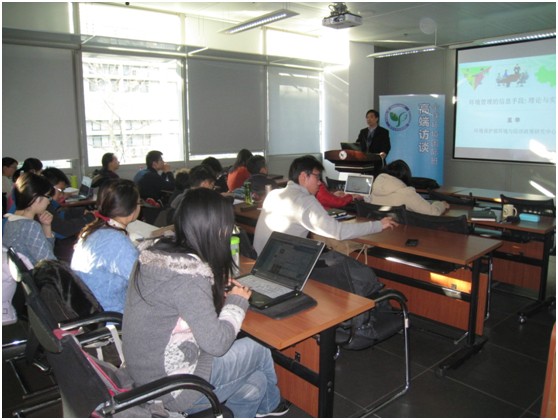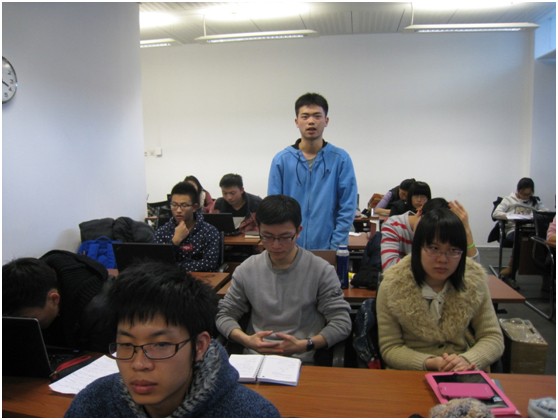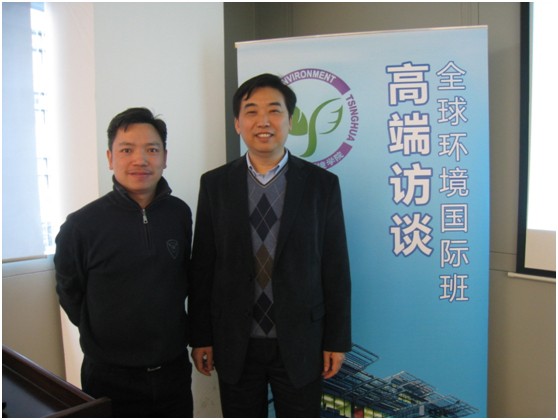Dr. Wang Hua, the researcher of the Policy Research Center for Environment and Economy of Ministry of Environmental Protection and the senior environmental economist of Research Department of World Bank, attended the “Top Talk” conducted by the Global Environment Program of School of Environment and hosted by Wang Can, the class teacher, on the afternoon of December 26, 2013, and gave a wonderful speech on “IT Approaches for Global Environmental Governance”.

Dr. Wang was giving a speech for Global Environment Program
Dr. Wang gave his speech from 4 perspectives: the IT approaches for environmental management; agencies promoting environmental information disclosure system; organizations and agencies for International environmental governance; current information disclosure system in China and impacts of relationships between governments, communities and NGOs towards environmental information disclosure. Dr. Wang held the view that, information disclosure acts as a catalyst, which will lay great influences on exposed governments, enterprises or individuals, urge the government to conduct environment protection and play its role by virtue of system; policy and non-policy approaches can both be utilized to urge enterprises to control the environmental pollution.

The students were proposing questions related to environmental governance

Dr. Wang Hua and Wang Can, the class teacher of Global Environment Program)
Dr. Wang stated that, there is still a long way to go in information disclosure on environmental governance in our country, but the progress is also undeniable, especially the progress in policies; he expected the students to focus on IT approaches on environmental governance, understand the theories as well as reinforce related practices.
Resume of Wang Hua:
Wang Hua, male, born in 1962 and came from Funing County, Jiangsu; the researcher of the Policy Research Center for Environment and Economy of Ministry of Environmental Protection and the senior environmental economist of World Bank’s Research Department; served concurrently as the president, chairman and honorary chairman of Professional Association For China's Environment, the deputy president of the Union of Chinese American Professional Association and the chairman of Association of Chinese Staffs of World Bank and IMF; Environmental Management and Policy Dr. of School of Public Health of University of North Carolina.
Dr. Wang has devoted himself in policy studies on resource environmental economics as well as its sustainable development for a long time; his studies mainly involve in green development strategy, development of resources, environment and regions, environmental economic policies, environmental information policies, environment and society governance, pollution behaviors of industrial enterprises, environmental law enforcement of local government, economic analysis on environmental policy benefits and costs, economic value evaluation on resources and environment, etc.
In terms of economic analysis of public policies and investment, Dr. Wang focused his studies on theories and approaches for economic value estimates of total benefits and devoted to the measurement of social economic value of public environmental goods and services by social survey; proposed and practiced the theory and method of random pricing; his research findings were published on top international core journals as well as tested and proven in China, America, India, Thailand, Bulgaria, Armenia and many other countries in terms of water quality, air quality, urban transportation, tap water supply as well as life value statistics; his new methods were implemented by World Bank in projects such as urban transportation and water quality improvement.
In terms of building sustainable development system, Dr. Wang assisted developing countries to build environmental information disclosure and public engagement mechanism, piloted in organizing roundtable meetings on community environment in Jiangsu, Hebei, Chongqing, Zhejiang, Liaoning and other regions, tried to establish roundtable conversation between stakeholders in China to mitigate social contradiction and environmental problems caused by economy development; the roundtable meetings on community environment are currently piloted in more than 20 cities in China.